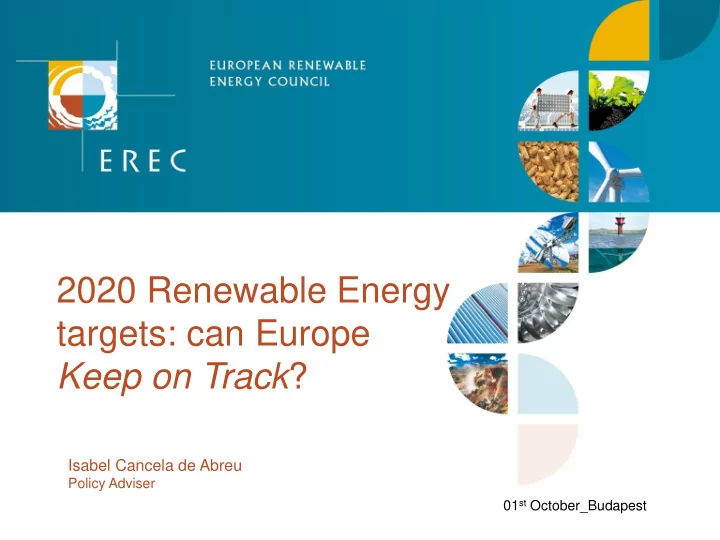

2020 Renewable Energy targets: can Europe Keep on Track ? Isabel Cancela de Abreu Policy Adviser 01 st October_Budapest
The consortium Contract number: IEE/11/842/SI2.616377 Duration: 36 months (30/06/2012-30/06/2015)
The Keep on track! concrete goals... Facilitate the implementation of the RES Directive at a national level (following the process already started with the REPAP2020 project www.repap2020.eu) Create an early warning system to alert those Member States that are deviating from their trajectory Help them to keep on track by: identification of main barriers to RES development market, legal and political advice and recommendations
... and outcomes... EU Tracking Roadmaps (in 2013, 2014 and 2015) Analysis of barriers and deviations (in 2013, 2014 and 2015) Policy recommendations (in 2013, 2014 and 2015) Legal Helpdesk (with online Legal Advice Facility) Consolidation of Parliamentary and Industry Networks
22 MS in 2011 are above their Progress in 2011/2012 interim targets Renewable Energy Development 5 MS in 2011 are below their (Status 2011) 2011/2012 interim targets (FR, UK, LU, NL, MT)
The EU is on track so far... RES Share in gross final energy consumption 25 actual overall RES share [%] 20 NREAP overall RES trajectory 15 10 minimum trajectory defined in the RES Directive 5 0 2005 2006 2007 2008 2009 2010 2011 2012 2013 2014 2015 2016 2017 2018 2019 2020
…with the transport sector below planned developments RES sector share in final sectoral energy consumption [%] 40.00 actual RES-E share 35.00 NREAP RES-E trajectory 30.00 25.00 actual RES-H share 20.00 NREAP RES-H trajectory 15.00 10.00 actual RES-T share 5.00 NREAP RES-T trajectory 0.00 2005 2006 2007 2008 2009 2010 2011 2012 2013 2014 2015 2016 2017 2018 2019 2020
2010-2011 Growth Rates vs. AAGR required to meet 2020 ambitions “Current policies being “In the heating & cooling sector in insufficient to trigger the required particular, it seems significant renewable energy deployment in 10.00 improvements in the policy a majority of Member States. ” framework are needed. ” (COM 2013 175 final) (COM SWD 2013 102 final) 8.00 6.00 4.00 2.00 0.00 Transport Electricity overall Heat -2.00
Hungary’s factsheet 2010 overall RES share Overall RES Share 2011 Overall RES share 2011/2012 interim target set by RES Directive 0% 1% 2% 3% 4% 5% 6% 7% 8% 9% 2011 NREAP target 30% 2011 RES-E share 25% 2020 NREAP RES-E target 20% 2011 RES-H share 15% 2020 NREAP RES-H target 10% 2011 RES-T share 5% 2020 NREAP RES-T target 0% Electricity Heat Transport Electrici ricity ty Trans nsport port Heat Tota tal ty ty rt rt Percentage of sector consumption in total final energy consumption in 2011 22% 53% 25% 99% consumption in 2011 2011 actual share of RES in sectoral gross final energy demand 6,4% 12,3% 0,5% 8,1% energy demand 6,5% 8,8% 4,6% 7,3% 2011 NREAP target - - - 6,0% 2011/2012 interim target set by RES Directive 10,9% 18,9% 10,0% 14,7% 2020 NREAP target
Hungary’s growth rates RES grow owth th rate tes s achiev hieved ed from om 2010 to to 2011 com ompared red to to RES grow owth th rate tes s required ired from om 2011 to to 2 2020 by secto tor Electricity 2010-2011 Electricity 2011-2020 50% Heat 2010-2011 40% 30% Heat 2011-2020 20% Transport 2010-2011 10% Transport 2011-2020 0% Overall 2010-2011 -10% -20% Overall 2011-2020 Overall Electricity Heat Transport
Reaching the RES Objectives: Today and in 2020...
The lack of long term vision for RES is the most important barrier …
And therefore the main recommendation is a stable legislative framework
Providing a clear signal for investors Growing the economy Reducing the costs of decarbonisation Reducing the costs of financing Reducing the need for support mechanisms Enhancing EU technology leadership Replacing fossil fuel imports Creating jobs Protecting the environment Diversifying technology
Thank you for your attention Isabel Cancela de Abreu abreu@erec.org www.erec.org
Recommend
More recommend